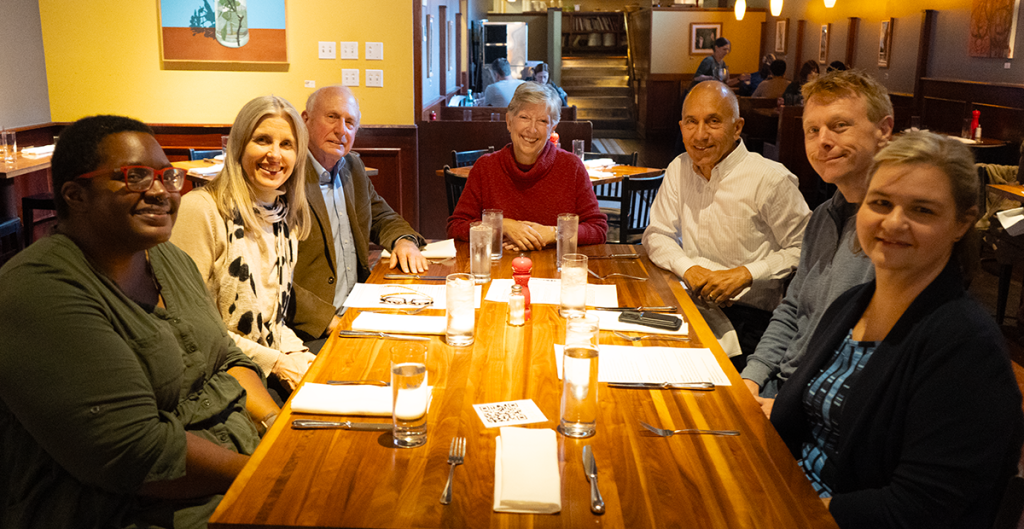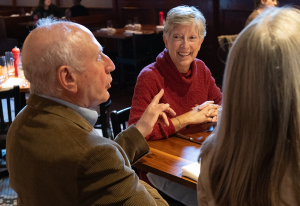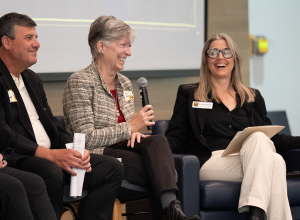Published on Dec. 17, 2024

Susan Duncan couldn’t help but smile as she listened to Chris Josey praise one of the students in his Extended One Read course. Josey, an associate teaching professor of communication, is one of three Tarkow Teaching Fellows in the University of Missouri Honors College, a program funded, in part, through an endowed gift given by Duncan.
Duncan recently had dinner near campus with all three Teaching Fellows, who are named in honor of Ted and Marjorie Tarkow. Ted Tarkow, who also attended the dinner, was an incredibly influential professor who Duncan has supported for decades.
“As Chris was rhapsodizing about this student, I suddenly had this vision that 30 or 40 years from now Chris would be sitting in the seat that Ted was occupying and his student was going to be where I was presently sitting,” Duncan said. “Chris was going to hear from the former student how much Chris meant to them. I was just in a place of deep gratitude. There are so many professors who are influencing lives in such a meaningful way, and I’m thrilled to be able to support this teaching cohort in the Honors College.”
Duncan, a Kansas City, Missouri, native, said there were two professors who stood out during her time as a student at Mizzou – Vera Townsend, an art history faculty member and early coordinator of the Humanities Sequence, and Tarkow, a professor emeritus of classical studies who is still active within the Humanities Sequence and the Extended One Read course. Duncan quickly formed a special connection with Tarkow in 1974.

“Ted is just extraordinary,” Duncan said. “He’s magnetic. In the classroom, he can be both funny and incredibly deep. Ted has that magic; you sit in his class and time is suspended. I and so many others are fortunate that we had him as a professor.”
While Duncan had supported Mizzou through the years, recent discussions have focused on her making an endowed gift, which is invested to generate funds in perpetuity to support specific programs, faculty, facilities or students. Duncan wanted her gift to impact Honors College students, making sure they could have more access to the outstanding faculty affiliated with the Honors College. She also wanted to honor a professor who had a major influence on her life.
“I’ve been a modest donor to Mizzou over the years,” Duncan said. “Most of my giving supported whatever Ted was directing. As we began discussions on an endowed gift, I originally wanted to get more students in front of Ted, but I also understood that he wasn’t in the classroom as much. We then discussed the Tarkow Teaching Fellows. I appreciated that it would support extraordinary faculty and, in turn, give Honors students more opportunities. I thought this model not only allowed us to honor Ted, but it created this strong cohort of professors from across campus who could learn from each other. I also liked the notion that the initiative would be interdisciplinary and include faculty from various departments.”
It was no coincidence that Duncan’s two favorite professors at Mizzou were heavily involved in the Humanities Sequence. The Humanities Sequence is an interdisciplinary, chronologically structured series of four Honors courses that introduces students to the big ideas, questions and debates of the Western tradition. The Sequence explores works of literature, philosophy, art, history, religion and music.
It was during Duncan’s first semester as an undergraduate student that she enrolled in one of those courses, offered through the Honors College. Fifty years later, the concepts Duncan learned and the relationships she built are as relevant as ever. She had a 30-year career managing both visual and performing arts organizations, with a specific focus on theater and music groups. Duncan credited the Humanities Sequence for sparking her passion for the arts.
“I chose Mizzou because I knew with so many degree programs and opportunities, I would eventually find my place,” Duncan said. “It was fortuitous to discover the Humanities Sequence. The Humanities Sequence, broadly, teaches critical thinking and intellectual rigor, which is fundamental to problem solving in complex environments. I appreciated the coursework’s wide ranging, interdisciplinary nature. It felt like each time I was introduced to a new discipline, I would switch my major! I went from English literature to cultural anthropology to linguistics and finally art history just in time to graduate.
“And, of course, the instructors had superior talent, were impressively passionate and inspiring.”
Duncan earned an art history undergraduate degree from Mizzou in 1978 and originally imagined a career in museum administration. That interest took her to California, where she studied art history at the graduate level before switching to arts administration. She earned an MBA in arts management from UCLA’s Anderson School of Management.
“The Humanities Sequence underscored how much I truly appreciated the visual arts, and it was where I was exposed to the performing arts,” Duncan said. “I really enjoyed reading the assigned plays of Sophocles, Shakespeare and O’Neill. The performing arts would actually become the most compelling dimension of my career and theater the discipline I loved the most. I still do, too. I’m a massive theater geek.”

Duncan enjoyed life on the West Coast and soon settled in northern California. Her professional career centered on non-profit arts groups in the San Francisco Bay Area, and most of her work was with mid-sized organizations as their managing director. A few had national and international reputations. She either consulted or served in an executive role with the World Choral Symposium, the California Shakespeare Theater, the Walt Disney Family Museum, the Monterey Museum of Art and Chanticleer, just to name a few.
Duncan said all those experiences were rewarding, but her time with Chanticleer definitely stood out. Chanticleer is a professional full-time male vocal ensemble that has won three Grammys over its existence. Duncan found the group first as an avid audience member and eventually served as executive director of the ensemble for around eight years.
“That work was so gratifying,” Duncan said. “While it was a smaller-budgeted organization, it recorded on a major classical label and toured internationally. I think one of the chief pleasures of working with Chanticleer was being partnered with Louis Botto, who founded the group in 1978 and was its longtime artistic director. My time employed to support and realize his vision was extraordinary.”
When Botto passed away in 1997, Duncan helped with the transition to the group’s next artistic director.
“That was an incredibly difficult time for the organization,” Duncan said. “As a result of that experience, I developed an expertise in executive transition management within non-profits, and I spent the last part of my consulting career helping with those circumstances. I would come in as an interim executive director and lead the organization through those challenges.”
In retirement, Duncan has stayed close to the humanities. She is a poet, actively publishing in literary journals. Duncan also regularly attends cultural events throughout the West Coast.
“The through line in all of these professional positions is that I got to work beside incredibly creative people, tasked with supporting their vision and work,” Duncan said. “I loved being able to stay close to the rehearsal hall or backstage, literally and figuratively. It’s been a rewarding journey. And it’s really amazing to think that it all started with my attending a Humanities Sequence course 50 years ago.”
Duncan said she is excited to see so much support behind the Humanities Sequence. She hopes that the Tarkow Teaching Fellows cohort continues to grow, too, and connects students and faculty like she was connected with Tarkow.
“I’m so supportive of students building meaningful associations with faculty,” Duncan said. “I’m glad to see the Honors College fostering those relationships. It’s been a big honor to play a small role in that, too.”